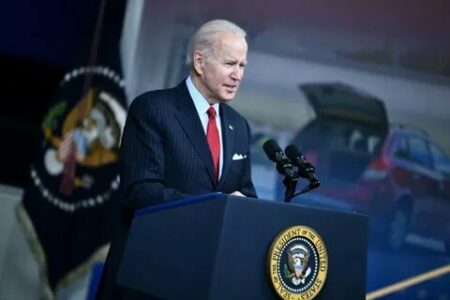Washington’s plan to organize a global summit of liberal democracies generates an escalation of tensions between the West and its geopolitical rivals.
Written by Lucas Leiroz, research fellow in international law at the Federal University of Rio de Janeiro.
An event to be held in December is already causing a vast escalation of tensions on the global geopolitical scenario. Washington’s plan to organize an international summit between “democratic” governments has received widespread criticism around the world. In fact, the event’s objective of strengthening democracies and fighting dictatorships seems to be a real excuse to boycott and impose coercive measures against rival nations of the US – commonly classified as “dictatorships”, mainly Russia and China.
Recently, the US government announced that it will organize an international event called Summit for Democracy, which will bring together countries with supposedly “democratic” governments in order to establish a joint strategic dialogue in favor of strengthening democratic institutions and isolating dictatorships. The event is scheduled to take place between December 9th and 10th, in virtual format.
There are three main topics to be discussed in the occasion: defending democracy against authoritarianism, fighting corruption, and advancing respect for human rights. Officially, the main objective of the event, according to the American government, is “to renew democracy at home and confront autocracies abroad”. The US government additionally states that “it will also showcase one of democracy’s unique strengths: the ability to acknowledge its imperfections and confront them openly and transparently, so that we may, as the United States Constitution puts it, ‘form a more perfect union’ “.
Interestingly, among the invited to participate in the summit, there are non-democratic countries, de facto non-recognized governments and states affected by institutional corruption. Countries that were facing problems with the American government due to issues related to the defense of democracy until recently – as the case of Poland, Iraq, Brazil, and many others – were strangely invited to the occasion. Separatist governments, such as Taiwan, will also attend.
When analyzing the list, it is possible to understand that the only factor taken into account by Washington when choosing the event’s participants is the geopolitical alignment, which greatly discredits this summit. In other words, a strange and polemical concept of democracy is once again being reaffirmed, according to which any government that is geopolitically aligned with the West is “democratic”, regardless of its internal political situation. And, on the other hand, a “dictatorship” is simply a government whose interests disagree with the existence of a unipolar order commanded by the US.
As expected, the summit has divided opinions around the world and generated criticism, mainly from the Chinese and Russians. In this sense, commenting on the case, the Chinese Foreign Minister Wang Yi said on Wednesday: “The so-called Summit for Democracy organized by the United States, in fact, under the banner of democracy, creates a split in the world, drawing ideological lines, which provokes confrontation between different camps, trying to change other sovereign countries like the United States to meet the strategic needs of Washington”. Also, Russian Foreign Ministry Spokeswoman Maria Zakharova stated: “This event, of course, has a confrontational, divisive focus and represents another link in Washington’s implementation of a course towards re-ideologizing international relations in the spirit of the notorious concept of a rule- based order”.
Indeed, the concern shown by Moscow and Beijing is just. A global event in defense of democracy would only have a positive aspect if the concept of democracy used to choose the participants was completely neutral, analyzing only the internal scenario of the chosen countries and ignoring geopolitical issues. By organizing an event whose objective is to strengthen a global bloc of geopolitical aligned nations, the US is simply carrying out a worldwide offensive against its enemies, which can be something really dangerous.
Predicting the consequences of such an event is a complicated task as many different decisions can be made at the summit. It is possible, for example, that participants will agree to establish anti-Russian and anti-Chinese measures internally (as well as against any other country not aligned with the US) in order to create a global legislative wave to boycott nations commercially and economically erroneously classified as “dictatorships”. In practice, this could be a move for the sanctions imposed by Washington (currently restricted to the unilateral scope of the US) to be shared by all liberal “democracies” in the world, which would be a disaster for the stability of international relations.
However, it is unlikely that any major US pretensions to this event will materialize in real long-term results. In an increasingly multipolar world with great economic dependence on China, ambitions to boycott US rivals on a global level seem completely unrealistic. In fact, if Washington still had the capacity to maintain a rigid unipolar order, calling such an event would be unnecessary, as all countries aligned with the West would naturally obey the measures imposed by the US and boycott illiberal “dictatorships”. But this reality is gradually more modified, as multilateralism grows, generating the possibility of depoliticized strategic partnerships of mutual interest for the parties involved, without major political, ideological, or geopolitical concerns.
In practice, the world is more and more polycentric, and the US is concerned about this, which is why it is investing in global boycott as a way of isolating its rivals. It remains to be seen how many of the “democracies” invited to the summit will agree with this.





Confrontation will result in world war – nuclear Armageddon. The warnings of history need to be heeded.
https://www.ghostsofhistory.wordpress.com/